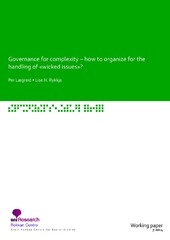| dc.contributor.author | Lægreid, Per | eng |
| dc.contributor.author | Rykkja, Lise Hellebø | eng |
| dc.date.accessioned | 2015-02-12T13:29:33Z | |
| dc.date.accessioned | 2020-12-10T06:35:07Z | |
| dc.date.available | 2015-02-12T13:29:33Z | |
| dc.date.available | 2020-12-10T06:35:07Z | |
| dc.date.issued | 2014-10 | eng |
| dc.identifier.issn | 1503-0946 | |
| dc.identifier.uri | https://hdl.handle.net/1956/9384 | |
| dc.description.abstract | This paper examines the main coordination arrangements for handling «wicked issues» in the area of societal security and welfare administration in Norway and ask whether network arrangements have replaced hierarchy. In both cases reforms have addressed major coordination problems related to both the vertical dimension and the horizontal dimension. Empirically we draw on data collected in four different research projects. Theoretically we apply a structural-instrumental perspective and a cultural perspective. We describe two new organizational arrangements: the lead agency approach and the onestop- shop and show how they develop as hybrid forms in the tension between the principles of ministerial responsibility and the principle of local self-government. A main finding is that the horizontal inter-organizational coordinating arrangements seem to supplement rather than replace traditional hierarchical coordination producing more complex organizational arrangements. | en_US |
| dc.language.iso | eng | eng |
| dc.publisher | Stein Rokkan Centre for Social Studies | eng |
| dc.relation.ispartofseries | Working paper 07-2014 | en_US |
| dc.title | Governance for complexity – how to organize for the handling of «wicked issues»? | eng |
| dc.type | Working paper | eng |
| dc.rights.holder | Copyright Stein Rokkan Centre for Social Studies. All rights reserved. | |
| dc.description.version | publishedVersion | |
| dc.subject.nsi | VDP::Samfunnsvitenskap: 200 | nob |
